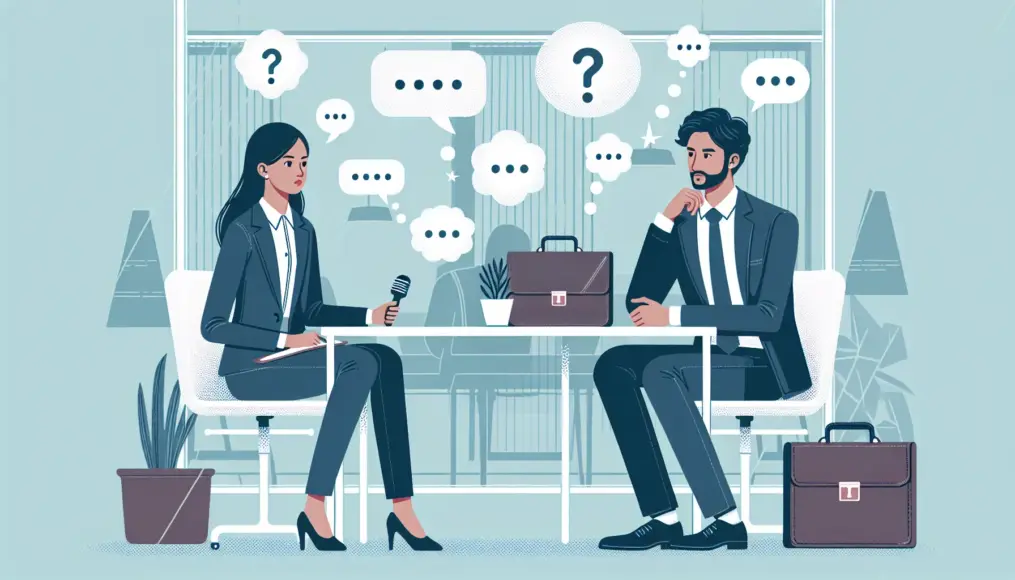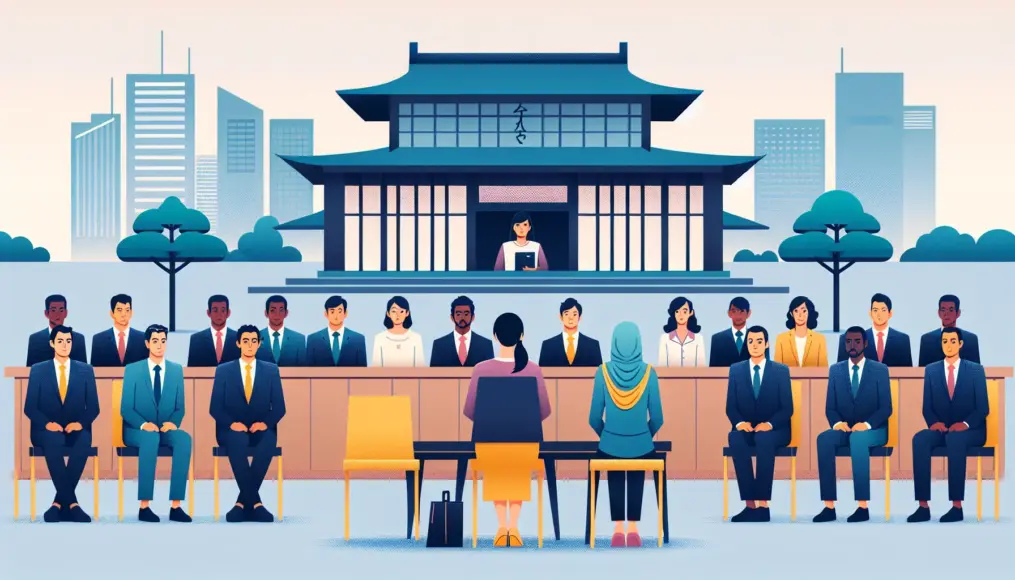The final question in a job interview carries significant weight. Through this question, interviewers gauge your interest and enthusiasm for the position. By understanding what kinds of questions may be asked and how to respond effectively, you can navigate the interview process to your advantage.
In this article, we’ll explore effective ways to answer the last question of the interview and highlight the importance of asking your own questions as well. With proper preparation, you can seize the opportunity to leave a positive impression on your interviewer.
- What are the typical final questions asked in interviews?
- How to structure an effective response
- The impression your questions can create, along with examples
What Questions are Typically Asked at the End of an Interview?
The questions posed at the end of an interview can be a crucial opportunity for you. By utilizing this moment effectively, you can clearly convey your enthusiasm and interest to the interviewer. Additionally, the final questions provide a great chance to showcase how well-prepared you are. Understanding what kinds of questions may arise and their underlying intent can help you respond more effectively.
In this section, we’ll explore some common questions that are typically asked at the end of interviews, along with the implications behind them. Use this information to prepare thoroughly and leave a positive impression during your interview.
Common Examples of Questions
There are several recurring patterns in the final questions you might encounter during an interview. For instance, you might hear, “Do you have any questions for us?” or “What are your expectations for working at this company?” These questions are often used to gauge your level of interest and understanding.
Interviewers are also keen to learn how you fit within the company culture. As such, questions like “What motivated you to apply to our company?” or “How do you think you can contribute?” are frequently encountered. Being prepared with solid answers to these questions can help you leave a good impression on the interviewer.
- You’ll often be asked, “Do you have any questions for us?” at the end of an interview.
- Many questions aim to gauge your interest in the company.
- It’s important to have well-thought-out answers ready.
Understanding the Intent Behind the Questions
Grasping the intent behind the interviewer’s final questions is crucial for delivering effective responses. In many cases, the last questions are designed to assess your seriousness and enthusiasm for the position. Therefore, it’s essential to communicate your thoughts and aspirations clearly when responding.
For example, if you’re asked, “What do you hope to learn at this company?” this question aims to determine whether you are looking for growth and how that growth might benefit the organization. By understanding the intent behind such questions, you’ll be better equipped to provide thoughtful and relevant answers.
- It’s important to understand the intent behind the interviewer’s questions.
- These questions are often designed to measure your eagerness and seriousness.
- Being prepared will allow you to provide precise answers.
How to Answer Effectively in Interviews
The way you respond to the final questions in an interview can significantly impact the impression you leave on the interviewer. Seizing this moment and approaching it appropriately can help you stand out. This is also an opportunity to express your own opinions and feelings, so it’s essential to prepare your response thoughtfully.
In this section, we’ll delve into how to structure effective answers and leverage these questions as opportunities for self-promotion. By grasping these concepts, you’ll be able to respond confidently at the end of your interview.
Structuring Your Answers
Having a clear structure for your answers during an interview is vital. Start by thoroughly understanding the question and succinctly summarizing your thoughts. A recommended approach is to state your conclusion first, followed by reasons and specific examples. This method ensures that your response is easy for the interviewer to comprehend.
Additionally, considering the intent behind the question can help you provide a more precise answer. By clearly demonstrating how your experiences and skills can be beneficial, you’ll leave a positive impression on the interviewer.
- Effective answers should follow the structure: conclusion → reason → specific example
- It’s important to consider the intent of the question
- Be specific about how your experiences and skills apply
Seize the Opportunity for Self-Promotion
The final question in an interview is a prime opportunity for self-promotion. Use this moment to highlight your strengths and how you can contribute to the company. For instance, if asked, “What do you hope to achieve at this company?” sharing your vision and specific goals can be very effective.
When promoting yourself, weave in your past experiences and achievements to explain how you can contribute to the company concretely. This approach will make it easier for the interviewer to sense your enthusiasm and suitability for the role. A well-prepared self-promotion can significantly enhance the overall impression you make during the interview.
Asking thoughtful questions at the end of the interview can also greatly influence their impression of you. To make sure you take this chance to show your interest and earn positive feedback, check out this article on “Techniques for Effective Reverse Questions to Stand Out in Final Interviews” for tips on preparing impactful questions.
- The final question is your chance for self-promotion
- Share your vision and goals
- Specific explanations incorporating past experiences are crucial
The Importance of Asking Questions in Interviews
At the end of an interview, you’re not only expected to answer questions from the interviewer but also to ask your own. This opportunity to pose questions, known as “reverse questioning,” is a crucial element that demonstrates your genuine interest in the company and its operations. Moreover, by engaging in reverse questioning, you can gain a deeper understanding of the company’s culture and work style, making it a valuable experience for both parties.
In this section, we will delve into the impression that reverse questioning creates and provide examples of effective questions to ask. By skillfully utilizing this technique, you can enhance your evaluation during the interview.
The Impression of Reverse Questioning
Asking questions shows a proactive attitude toward the interviewer. It clearly communicates your interest, which can leave a positive impression. Additionally, reverse questioning serves as a way to convey that you are seriously considering a position within the company.
On the flip side, failing to ask questions might lead to perceptions of disinterest or lack of preparation. Thus, reverse questioning is one of the key points to focus on at the end of an interview, and it’s essential to prepare adequately for this part.
- Reverse questioning demonstrates a proactive attitude
- It conveys your interest in the company
- It’s important to ask questions to avoid appearing indifferent
Examples of Effective Reverse Questions
Having effective questions prepared can further enhance your impression during the interview. For instance, asking, “What is the team dynamic like in this company?” or “What skills are particularly valued for upcoming projects?” are excellent examples of specific questions that can be beneficial.
These types of questions not only deepen your understanding of the company’s culture and operations but also express your interest to the interviewer. Furthermore, they can prompt you to think about how you might grow within that environment, so be sure to actively incorporate reverse questioning into your interview strategy.
- Preparing specific questions is effective
- It’s a chance to learn about the company’s culture and operations
- You can show your interest in the interviewer
Making a Lasting Impression in Your Interview
The end of an interview presents a golden opportunity for you to leave a positive impression on your interviewer. The questions you ask and how you respond at this point can significantly influence the overall perception of your interview. It’s essential to prepare thoroughly, considering what questions to ask and how to follow up afterward.
In this section, we’ll delve into how to choose the right questions during your interview and the importance of post-interview follow-ups. By understanding and practicing these points, you can create a more favorable impression.
Choosing the Right Questions
The questions you ask at the end of your interview are particularly significant. They not only demonstrate your interest and enthusiasm but also provide a chance to express your gratitude and respect toward the interviewer. For instance, asking about the company culture, the team dynamics, or the skills expected in the upcoming role can be very effective.
When selecting your questions, it’s crucial to do your research ahead of time. Tailoring your inquiries to align with the company’s characteristics and job specifics will allow you to ask more meaningful and relevant questions, ultimately leaving a good impression on the interviewer.
- It’s important to ask questions that convey gratitude and respect.
- Inquire about the company culture and team dynamics.
- Prior research enhances the quality of your questions.
Follow-Up After the Interview
Following up after your interview is another vital step in making a positive impression. Sending a thank-you email not only shows good manners but also reinforces your seriousness about the position. In this email, it’s beneficial to reflect on the conversation you had during the interview and express specific gratitude for any insights shared.
A follow-up is not just a courtesy; it also serves as an opportunity to convey your genuine interest in working for the company. A thoughtful follow-up can leave a strong impression on the interviewer and potentially give you an edge in the selection process.
To truly impress during your interview, the way you choose questions and execute your follow-up is crucial. Additionally, it helps to be aware of specific examples of effective questions. If you’re curious about what questions to ask at the end of your interview, check out this article: “Stand Out at the End of Your Interview! Example Questions and Their Intent.” Understanding the intent behind specific questions can further enhance your impression.
- A thank-you email after the interview is an important follow-up.
- It’s essential to convey specific gratitude.
- Don’t miss the chance to showcase your seriousness through follow-up.
Summary
The questions asked at the end of an interview can significantly influence the impression you leave. By asking thoughtful questions, you not only demonstrate your interest and enthusiasm to the interviewer but also create opportunities to showcase your strengths. With careful preparation and an understanding of how to choose your questions and follow up effectively, you can enhance your evaluation during the interview.
Through this summary, we hope you’ve gained a deeper understanding of the significance of the final questions in an interview and developed a practical approach to handle them. Use this as a reference to approach your interviews with confidence.
- The final questions in an interview can define your impression
- Asking questions shows your interest and motivation
- Follow-ups are a chance to demonstrate your seriousness
We hope this information about interviews proves helpful to you. Please feel free to share your thoughts or questions in the comments!



Comment